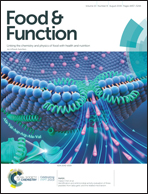Protective effects of trans-2,3,5,4′-tetrahydroxystilbene 2-O-β-d-glucopyranoside on liver fibrosis and renal injury induced by CCl4via down-regulating p-ERK1/2 and p-Smad1/2
Abstract
Both as a food and an herbal plant, Polygonum multiflorum (PM) has long been used in food and prescriptions for several centuries in Southeast Asia. trans-2,3,5,4′-tetrahydroxystilbene 2-O-β-D-glucopyranoside (trans-THSG) is one of the major compounds derived from PM and has been reported to exhibit multiple biological activities such as antioxidation and anti-obesity activities among others. The current study was aimed at investigating the effects of trans-THSG on liver fibrosis and renal injury in a carbon tetrachloride (CCl4) induced rodent model via oral feeding. Research results have demonstrated that administration of trans-THSG (100 and 300 mg kg−1) significantly ameliorated liver fibrosis, manifested by reduced expression of desmin and α-smooth muscle actin (α-SMA) plus collagen deposition. Specifically, treatment with trans-THSG effectively decreased the levels of transforming growth factor-β (TGF-β) and reduced the phosphorylation of Smad1/2 (p-Smad1/2) and extracellular signal-regulated kinases 1/2 (p-ERK1/2). Furthermore, we found that trans-THSG significantly down-regulated CCl4-induced excessive collagen secretion and increased the levels of desmin, MMP2 and MMP9 in rat liver tissues, suggesting that trans-THSG prevents liver fibrosis by attenuating the activation of hepatic stellate cells (HSCs) through the inhibition of Smad and ERK signaling pathways. Hence, the present findings demonstrate that trans-THSG is an effective antifibrotic agent in protecting liver from CCl4-induced toxicity.



 Please wait while we load your content...
Please wait while we load your content...